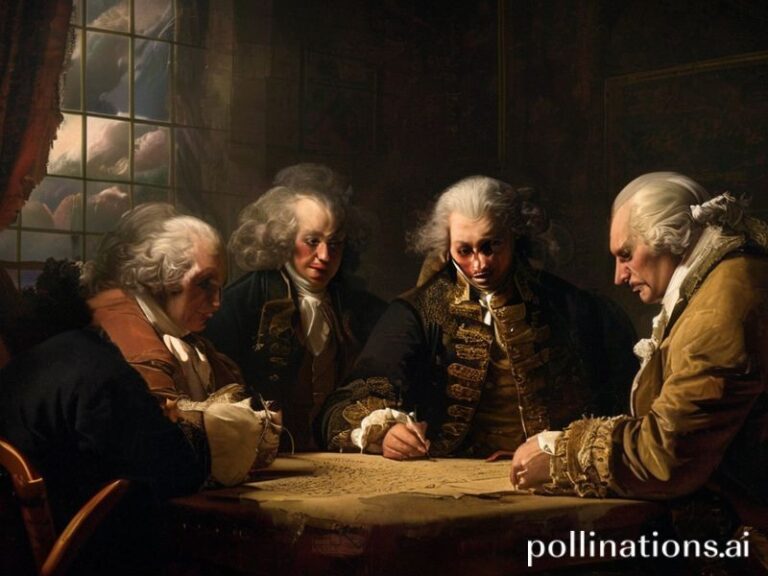Straka Golf: How One Quiet Austrian Became the Global Metaphor for Our Expensive, Irrigated Apocalypse
Straka Golf and the Quiet Globalization of a Very Loud Game
by Dave’s Locker International Desk
If you were anywhere near the Algarve last spring, you might have mistaken the muffled thuds for distant artillery. They were, in fact, the sound of Austrian Sepp Straka—world-ranked somewhere between “household name” and “who?”—driving Titleists into Portuguese cork forests at roughly the same velocity NATO once reserved for Soviet radar installations. That, dear reader, is the essence of Straka Golf: a sport so determinedly pastoral that even its explosions of kinetic nationalism arrive gift-wrapped in hushed commentary and pastel sun-visors.
Straka, for the uninitiated, is the transatlantic love child of Vienna and Valdosta, Georgia—a dual citizen who speaks four languages and still can’t find a decent Wi-Fi signal in any of them. His rise through the DP World Tour (formerly the European Tour, formerly the “Let’s Keep Colonial Tourism Alive Open”) is less a Cinderella story than a slow-motion hostage negotiation between Old-World etiquette and American branding. Every birdie he cards is another small surrender of European understatement to the global imperative that everything—yes, even your grandfather’s hushed reverence for the 13th at Augusta—must eventually be monetized, meme-ified, and sold back to you as a non-fungible divot.
The implications, naturally, are planetary. Consider Japan, where televised Straka highlights are re-broadcast at 3 a.m. with the hushed solemnity of a funeral for a beloved fax machine. Or South Korea, where betting syndicates now handicap his four-iron yardage the way currency traders once tracked the won. In Dubai, sheikhs who already own half of Scotland’s coastline have begun inquiring whether Straka would consider changing his surname to something more pronounceable in Arabic tweets—offers he has, so far, declined with the polite firmness of a man who still irons his own slacks.
Even the Chinese golf boom—an oxymoron on par with “ethical cryptocurrency”—has taken note. At Mission Hills Haikou, coaches now splice Straka’s swing into state-approved training apps, right between lessons on socialist core values and the correct grip for avoiding ideological backspin. One imagines Xi Jinping himself, late at night, scrolling through slow-motion replays and muttering, “Why can’t our comrades lag-putt like that?” (The answer, of course, is that most comrades are still busy manufacturing the clubs.)
Then there is Africa. South Africa already produces more world-class golfers per capita than anywhere else, but north of the Limpopo the game remains an exquisite colonial aftertaste—like Earl Grey served in a tin once used to store land deeds. Straka’s multicultural branding offers a rare PR opportunity: a white guy from a landlocked alpine republic who still looks less like Cecil Rhodes than most members of the Royal & Ancient. NGOs from Nairobi to Lagos have begun experimenting with “Straka Clinics,” where barefoot kids learn to yell “Fore!” in Austrian-accented English while EU development officers scribble impact-assessment reports on recycled Masters notepads.
Let us not ignore the ecological subplot. Each Straka tournament requires roughly 300,000 gallons of desalinated water a day to keep Bermuda grass from staging a desert revolt. Climate scientists now rank golf tourism just below bitcoin mining and just above artisanal beef jerky in the global hierarchy of self-inflicted wounds. Yet the carbon offsets are packaged as “eco-stewardship,” a phrase that sounds best when whispered from the back of a courtesy Lexus hybrid idling in the VIP lane.
So what does it all mean? Simply this: in a world fracturing along every conceivable fault line—trade, tech, ideology, temperature—the quiet export of Straka Golf is a reminder that humanity’s most reliable common denominator remains the urge to whack something expensive into an artificially maintained void and then pretend the outcome matters. The game’s new internationalism is less kumbaya than kabuki: elaborate, stylized, faintly ridiculous, and ultimately profitable for whoever owns the broadcast rights.
As the sun sets over yet another seaside finishing hole, the announcers murmur their platitudes, the sponsors flash their logos, and the planet tilts another imperceptible degree toward whatever passes for tomorrow. Somewhere in the lengthening shadows, Sepp Straka signs one more autograph, politely declining a complimentary Gulfstream brochure. The crowd disperses, already scrolling for tee times in Singapore or Scottsdale, each pilgrim convinced that somewhere, on some perfectly irrigated fairway, the next transcendent moment awaits.
Spoiler: it doesn’t. But the bar is open, and the world, having nothing better to do, will watch.







